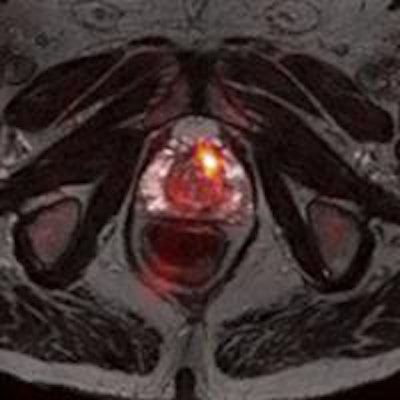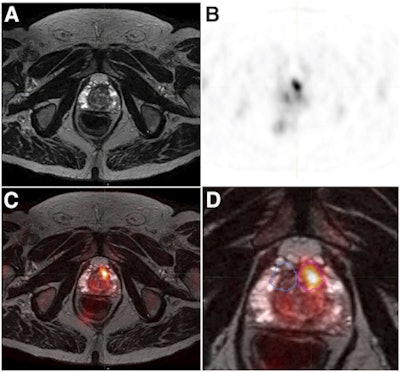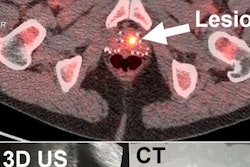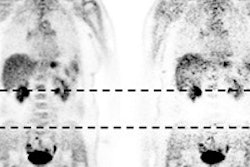
The combination of F-18 choline PET and multiparametric MRI (mpMRI) shows promise for detecting prostate cancer, according to a study in the July issue of the Journal of Nuclear Medicine.
Researchers from the University of Michigan found that adding PET to mpMRI for targeted transrectal prostate biopsies better identified significant prostate cancer than MRI-guided or standard, nontargeted biopsies.
Lead author and professor of radiology Dr. Morand Piert said the positive results suggest that PET/MRI may become the preferred imaging test for men with suspected but undetected prostate cancer, or for patients undergoing surveillance for known low-risk prostate cancer.
The researchers assessed 36 men with rising prostate-specific antigen (PSA) levels to evaluate fusion F-18 choline PET/MRI for image-guided prostate biopsies to detect significant prostate cancer, compared with standard biopsies. Biopsy procedures were performed after real-time transrectal ultrasound (TRUS) (JNM, July 2016, Vol. 57:7, pp. 1065-1070).
Fifteen subjects had significant prostate cancer; F-18 choline PET/MRI-guided biopsies identified prostate cancer in 12 patients, while standard biopsy detected only five cases.
 T2-weighted fast spin-echo MRI (A), F-18 choline PET (B), and fused PET/MRI (C) show a 0.68-cm3 left anterior transitional zone lesion that was confirmed on targeted biopsy. A magnified view of PET/MRI (D) shows a target lesion (magenta) and respective mirrored (blue) background volumes of interest. Image courtesy of JNM.
T2-weighted fast spin-echo MRI (A), F-18 choline PET (B), and fused PET/MRI (C) show a 0.68-cm3 left anterior transitional zone lesion that was confirmed on targeted biopsy. A magnified view of PET/MRI (D) shows a target lesion (magenta) and respective mirrored (blue) background volumes of interest. Image courtesy of JNM.A total of 52 lesions were detected by multiparametric MRI (19 low, 18 intermediate, and 15 high-risk), and mpMRI-assigned risk was a strong predictor of final pathology (area under the curve [AUC] = 0.81, p < 0.001).
Using the mean F-18 choline target-to-background ratio, the addition of F-18 choline to mpMRI significantly improved the prediction of significant cancers, compared with mpMRI alone (AUC = 0.92, p < 0.001).
Based on the results, Piert and colleagues concluded that fusion PET/MRI-TRUS image registration for targeted prostate biopsies is clinically feasible and accurate. In addition, adding F-18 choline PET to mpMRI can improve the detection of significant prostate cancer.




















